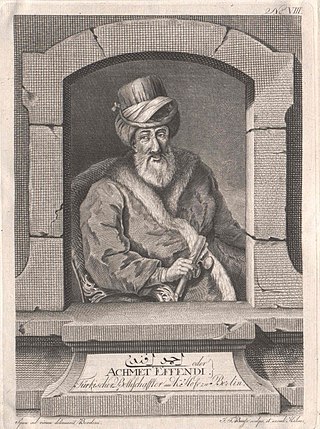
A revenue stamp, tax stamp, duty stamp or fiscal stamp is a (usually) adhesive label used to designate collected taxes or fees on documents, tobacco, alcoholic drinks, drugs and medicines, playing cards, hunting licenses, firearm registration, and many other things. Typically, businesses purchase the stamps from the government, and attach them to taxed items as part of putting the items on sale, or in the case of documents, as part of filling out the form.

A raiyah or reaya was a member of the tax-paying lower class of Ottoman society, in contrast to the askeri and kul. The raiyah made up over 90% of the general population in the millet communities. In the Muslim world, raiyah is literally subject of a government or sovereign. The raiyah included Christians, Muslims, and Jews who were 'shorn' to support the state and the associated 'professional Ottoman' class.

Slana Bara is an urban neighborhood of the city of Novi Sad, Serbia.

Ahmed Resmî Efendi, also called by some Arabic sources as Ahmed bin İbrahim Giridî, was an Ottoman Greek statesman, diplomat and author of the late 18th century. In international relations terms, his most important - and unfortunate - task was to act as the chief of the Ottoman delegation during the negotiations and the signature of the Treaty of Küçük Kaynarca. In the literary domain, he is remembered for various works among which his sefâretnâme recounting his embassies in Berlin and Vienna occupy a prominent place. He was Turkey's first ever ambassador in Berlin.
The Ottoman Land Code of 1858 was the beginning of a systematic land reform programme during the Tanzimat (reform) period of the Ottoman Empire in the second half of the 19th century. This was followed by the 1873 land emancipation act.
Nüzül was a tax in the Ottoman Empire.
İspençe was a land tax levied on non-Muslims in the Ottoman Empire.
Avarız was a property tax in the Ottoman Empire, an annual cash tax paid by households registered in a defter.
Taxation in the Ottoman Empire changed drastically over time, and was a complex patchwork of different taxes, exemptions, and local customs.
The Resm-i Çift was a tax in the Ottoman Empire. It was a tax on farmland, assessed at a fixed annual rate per çift, and paid by land-owning Muslims. Some Imams and some civil servants were exempted from the resm-i çift.
The damga resmi was a form of stamp duty in the Ottoman Empire.
The tuz resmi was a tax on salt in the Ottoman Empire.
The resm-i arus, or resm-i arusane, was a feudal bride-tax in the Ottoman Empire. It was typically a fixed fee, a divani tax; it was paid around the time of marriage, to the timar-holder, or even to a tax-farmer in their stead. The tax-collector might record details of individual marriages, although this was not equivalent to the church marriage-registers in contemporary western Europe and some of the tax records are unclear.
The gümrük resmi was a customs charge, or tax, in the Ottoman Empire. In modern-day Turkey the term continues to be in use: Gümrük vergi ve resimleri.
Müskirat resmi was a tax on alcohol in the Ottoman Empire.
Ashar was a tax in the Ottoman Empire, based on the traditional practice of muqasama, a traditional tithe in the Fertile Crescent. It was abolished on 17 February 1925 in Turkey the successor of the Ottoman Empire.
The resm-i mücerred was a bachelor tax in the Ottoman Empire, related to the resm-i çift and the resm-i bennâk.
The tapu resmi was a feudal land tax in the Ottoman Empire.
Ihtisab, or ihtisap was a type of tax on markets in the Ottoman Empire; the muhtasib or ihtisap ağasi - the ihtisab collector - had a broader role in regulating and taxing markets under the authority of the kadı.
The Ottoman Tobacco Company, also known as the Régie Company for its French official name Société de la régie co-intéressée des tabacs de l'empire Ottoman, was a parastatal company or Regie formed in the later Ottoman Empire by the Ottoman Public Debt Administration, with backing from a consortium of European banks. The company had a monopoly over tobacco production, and its revenue was intended to help overcome the Ottoman state's persistent shortage of income. The Ottoman Tobacco Company constituted the largest foreign investment in the Ottoman Empire, and it attempted to introduce more efficient production methods – against local resistance.



